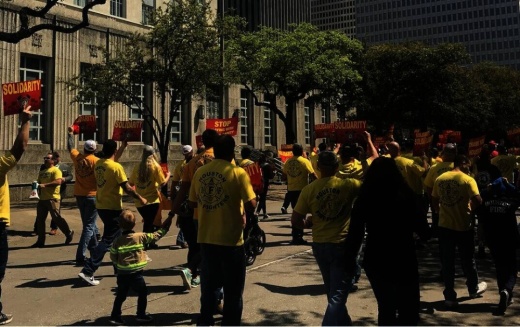The measure, known as Proposition B, requires Houston firefighters to receive the same pay as Houston police officers of comparable rank.
“Houston voters approved pay parity for firefighters, and now the courts have upheld that vote. Prop. B is the law, and it is time to sit down and get this issue resolved," said Patrick M. “Marty” Lancton, the president of the Houston Professional Fire Fighters Association, in a news release.
A statement from the city attorney's office says the city is prepared to appeal the ruling.
"The City of Houston respectfully disagrees with today’s Fourteenth Court of Appeals decision where, in a divided 2-1 vote, the majority reversed the trial court’s determination that the firefighter pay parity charter amendment was unconstitutional," City Attorney Arturo Michel said. "The net effect of what the Firefighter’s Union is seeking would be financially devastating to the City. The City will seek review of the decision through either reconsideration by the entire Fourteenth Court of Appeals, the Texas Supreme Court, or both."
After reaching an impasse in contract negotiations with Mayor Sylvester Turner in 2017, the firefighters union pursued the measure as a way to secure pay raises. Since 2018, the proposal has been caught in a legal battle between the city and the union.
Turner has repeatedly said the cost of the raises, estimated by the city to be $100 million, is too high. The dispute came to head in April 2019 when Turner and City Council approved 220 firefighter layoffs to fund the raises.
The layoffs were revoked soon after, however, when a district judge ruled Proposition B unconstitutional and ordered both parties to re-enter mediation instead of requiring the city fund the pay parity proposal. The union and the mayor ultimately left the talks without reaching an agreement, and the union appealed the ruling again.
The July 29 decision from the 14th Court of Appeals once again puts the city on the hook for the pay increases despite having used federal COVID-19 relief funds to give an 18% raise to firefighters over the next three years. Characterized by the union as “bonuses,” those pay increases announced May 19 do not have a funding source set aside after the federal funds run out, Turner said at the time of the announcement.
Another union win
The ruling was the second legal blow dealt to Turner in recent months. A separate case between the union and the mayor also made its way to the 14th Court of Appeals, which ruled in the union’s favor May 6.
The city pursued that lawsuit after the 2017 impasse. City lawyers argued a provision in state collective bargaining law, which the union operates under, is unconstitutional. In it, the labor law states in the event of an impasse, a judge can establish the terms of a labor contract and use a private-sector comparison as the basis for the pay rate.
Turner’s administration argued the provision represented an overreach of judicial powers, but the appeals court ruled in favor of upholding the provision, legal documents show.
Separate pursuit
Since the 2017 impasse, the firefighters have operated without a new labor contract. Receiving raises through the COVID-19 funds or legal action does not mean a contract is not needed, however. A contract also dictates health and retirement benefits, among other terms.
“The mayor can’t simply say, 'We're going to solve a problem because we're going to use these [COVID-19] funds, and that's the end of it,'” Richard Carlson, a professor at South Texas College of Law who specializes in collective bargaining law, told Community Impact Newspaper in May.
In another ongoing effort, the firefighters union circulated a petition for another charter amendment that leaders hope will appear on the November ballot for voters to consider.
As proposed, the amendment would require the city and the firefighters union to enter binding arbitration after an impasse rather than mediation. Binding arbitration, unlike mediation, legally requires both parties to enter an agreement as determined by an independent arbiter, rather than having the option to walk away without a deal.
It is not clear yet, however, whether the proposal will make it onto the November ballot. Prior to the Aug. 16 election filing deadline, the Houston city secretary needs to verify petition signatures, and Houston City Council must vote to approve the verification. Neither step has occurred yet.





